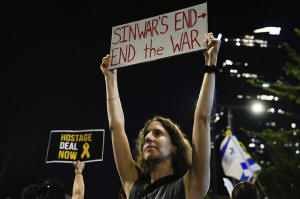Sinwar's killing opens up opportunity and much uncertainty for the war
in Gaza
 Send a link to a friend
Send a link to a friend
 [October 18, 2024]
By TIA GOLDENBERG and JACK JEFFERY [October 18, 2024]
By TIA GOLDENBERG and JACK JEFFERY
TEL AVIV, Israel (AP) — Israel’s killing of Yahya Sinwar, Hamas’ top
leader and the mastermind of the group’s Oct. 7 attack, is a dramatic
turning point in the brutal yearlong war that it touched off.
Sinwar’s killing on Thursday decapitates the Palestinian militant group
that has already been reeling from months of assassinations up and down
its ranks. And it is a potent symbolic achievement for Israel in its
battle to destroy Hamas.
The killing, coming just 10 days after Israelis and Palestinians marked
a year since the deadliest fighting in their decades-old conflict
erupted, could set the stage for how the remainder of the war plays out,
or even prompt its conclusion — depending on how Israel and Hamas choose
to proceed.
Sinwar's death could serve as an off-ramp for Israel toward ending
the war
Sinwar, who was appointed head of Hamas after its previous leader was
killed in a blast in July blamed on Israel, spent years building up
Hamas’ military strength and is believed to have devised the Oct. 7,
2023, attack. After that assault, when Hamas-led militants killed some
1,200 people and abducted about 250 others, Israel pledged to destroy
Hamas and kill each one of its leaders.
With Sinwar at the top of that wanted list, his death is a major
achievement for Israel. Analysts say Sinwar’s killing has presented
Israel, which has struggled to articulate an exit strategy from Gaza,
with an off-ramp to end the war.
“This would really be the cherry on the icing of the cake for Israel,”
said Nomi Bar-Yaacov, an associate fellow of the International Security
Program at the Chatham House think tank in London. “It should be easier
to reach a deal.”

With the architect of the Oct. 7 attacks eliminated, Prime Minister
Benjamin Netanyahu could now tell Israelis that one of the war's aims
has been reached. Politically, that might allow him to be more flexible
on a cease-fire deal that ends the war in exchange for hostages — a
condition he has so far refused to accept, at least in part, critics
say, because it could threaten his rule.
Sinwar's death could have broader implications, depending on Israel's
next moves
Analysts said the achievement was such a gamechanger that it was an
opportunity for Israel to signal that it is ready to end the fighting
further afield in the region, including in Lebanon where Israel is
battling Hezbollah.
“The opportunity to end the war entirely, as well as in Lebanon, ... it
is entirely in our hands,” Giora Eiland, a former head of Israel’s
National Security Council, told Israeli Channel 12 News, saying Israel
must use Sinwar's death to present its conditions for ending the wars on
both fronts.
The families of hostages in Gaza had a similar message for Netanyahu. A
group representing the families welcomed Sinwar's killing but
recognizing the potential opportunity, called on Israel to reconcentrate
its efforts toward negotiating a deal.
“Netanyahu, don't bury the hostages. Go now to the negotiators and the
Israeli public and present a new Israeli initiative,” Einav Zangauker,
whose son Matan is held in Gaza, said in a post on social media.
Khaled Elgindy, a senior fellow at the Washington-based Middle East
Institute think tank, cautioned that Netanyahu has shown few indications
that he is looking for an end to the conflict, with the army
intensifying its operations in the north of Gaza in recent weeks.

[to top of second column]
|

A demonstrator holds a sign about the killing of Hamas leader Yahya
Sinwar during a protest calling for a cease-fire deal and the
immediate release of hostages held by Hamas on Thursday, Oct. 17,
2024, in Tel Aviv, Israel. (AP Photo/Ariel Schalit)

“The war ... is not over yet,” Netanyahu said in a video statement
after the killing.
Netanyahu rules with the support of two far-right parties that have
threatened to topple the government if the war ends under a
cease-fire deal. They repeated their opposition to a deal after
Sinwar's killing. They are also supporters of establishing Israeli
settlements in the Gaza Strip, something the Israeli leader has
publicly ruled out.
Netanyahu, who is on trial for alleged corruption, has also seen his
political fortunes rise throughout the war, after they plummeted in
response to Hamas' attack last year. Prolonging the war allows him
to enjoy boosts of support after whatever successes he notches.
Other top Hamas officials may be more pliable
Sinwar was seen as a hard-liner with close ties to Hamas’ armed
wing, and throughout repeated cease-fire negotiations with Israel
was seen as having the final word on any agreement for Gaza and the
release of dozens of Israeli hostages.
Sinwar's positions were directly at odds with Israel's. He stuck to
demands for the release of hundreds of Palestinian prisoners, the
full withdrawal of Israeli forces from Gaza and a lasting cease-fire
— even as more than 42,000 Palestinians have been killed in the
ongoing war, according to local officials, and much of the territory
left in ruins.
According to Elgindy, Sinwar’s death will likely give more
flexibility and control to the group’s political leadership in
Qatar. This includes Khalil al-Hayya and Khaled Mashaal, key Hamas
delegates of the monthslong talks.
Those leaders could be more responsive to pressure from Qatar, a key
mediator that hosts some of Hamas' top leaders. Unlike Sinwar, these
leaders are also not in hiding in Gaza, which could speed up
progress on a deal.
Hamas leaders have proved replaceable in the past
For Hamas, Sinwar’s killing leaves a gaping hole in the militant
group’s leadership, with its future in Gaza and beyond uncertain. It
is a symbolic blow for a group already reeling from multiple
assassinations of its leaders.

An Israeli airstrike killed Marwan Issa, deputy leader of Hamas’
military wing in March. Ismail Haniyeh, Hamas' former political
leader, was assassinated in the blast in Tehran in July blamed on
Israel.
Then in August, Israel said it killed Mohammed Deif, Hamas’ military
chief and co-mastermind of the Oct. 7 attack, in an airstrike. Hamas
has not confirmed that death.
Elgindy called Sinwar's killing a “major blow” to Hamas. But, he
added, it was "not fatal since everyone is replaceable.”
Still, with so many leaders and commanders killed, at this point,
it’s not clear who could fill his shoes.
___
Jeffery reported from Ramallah, West Bank. Associated Press writer
Danica Kirka contributed from London.
All contents © copyright 2024 Associated Press. All rights reserved |